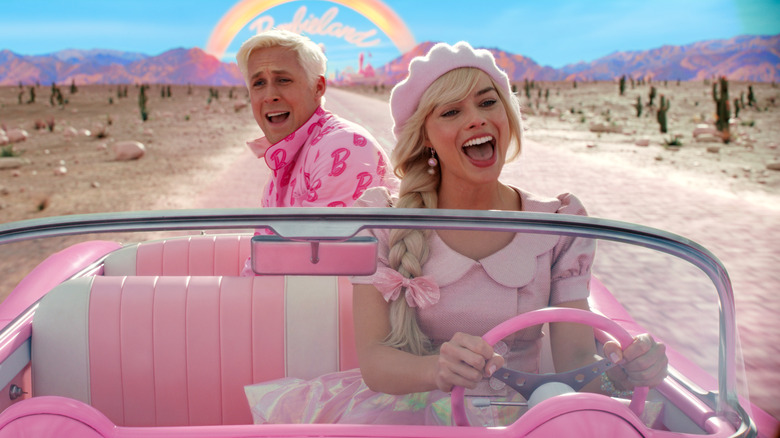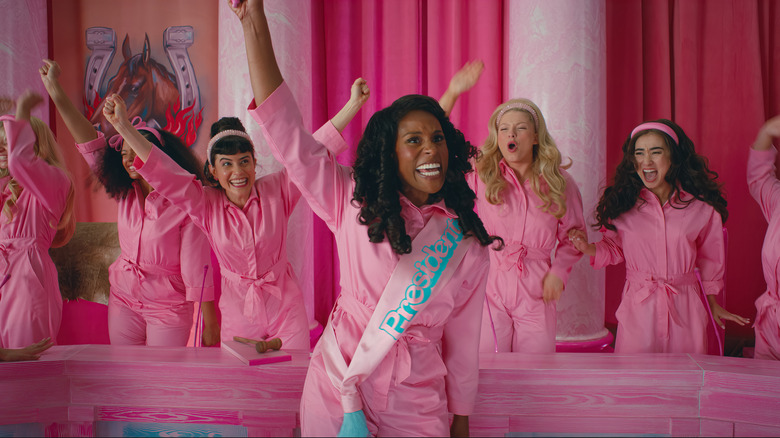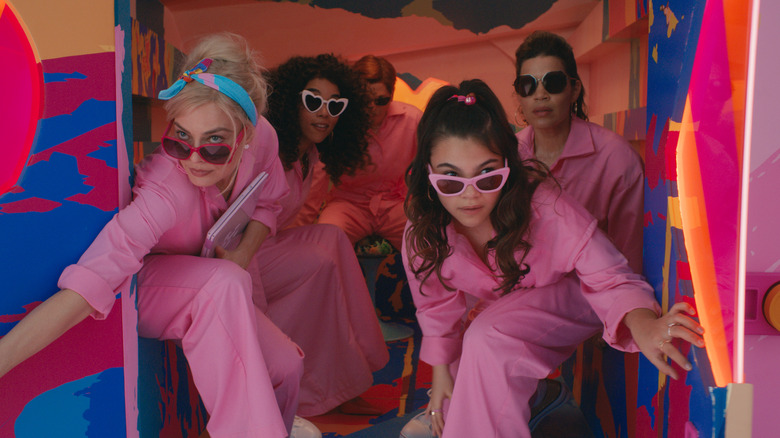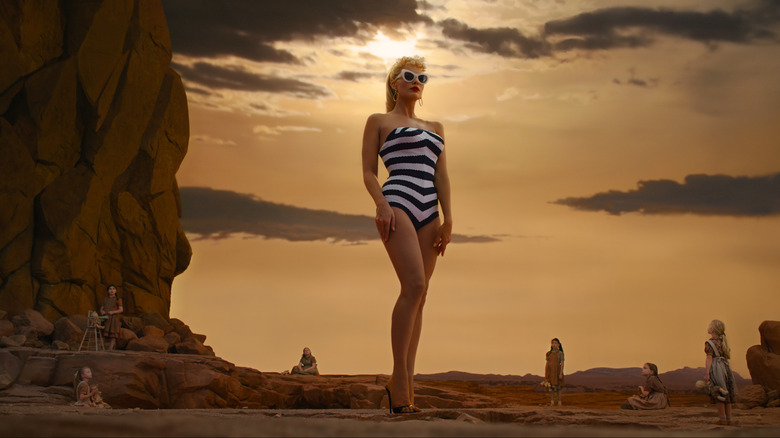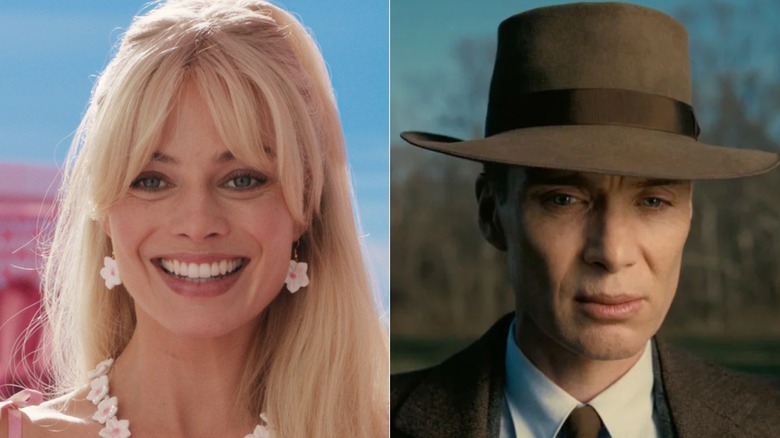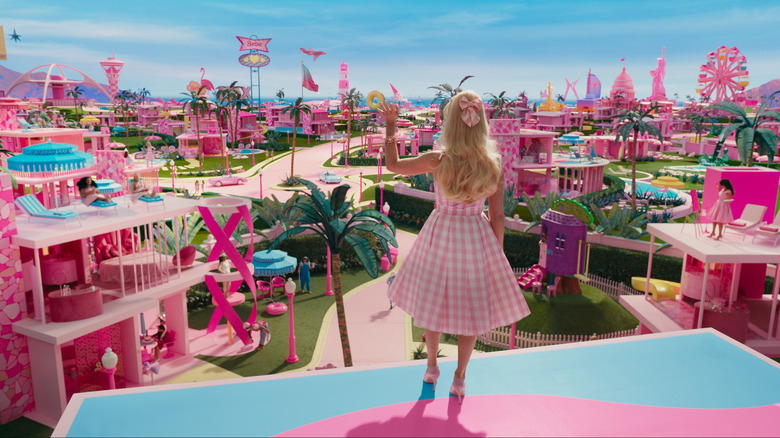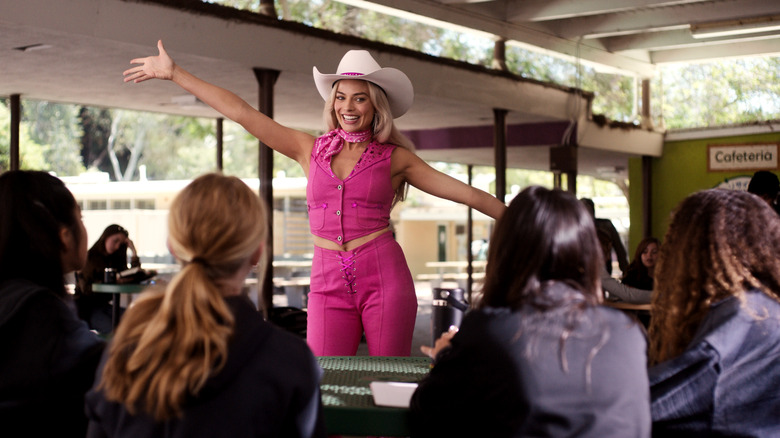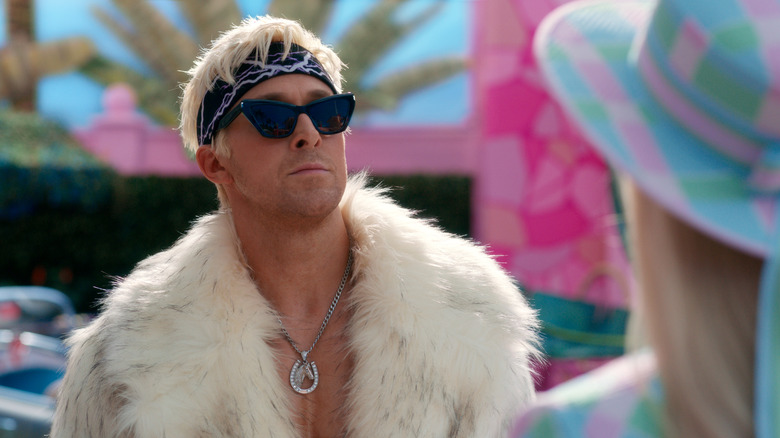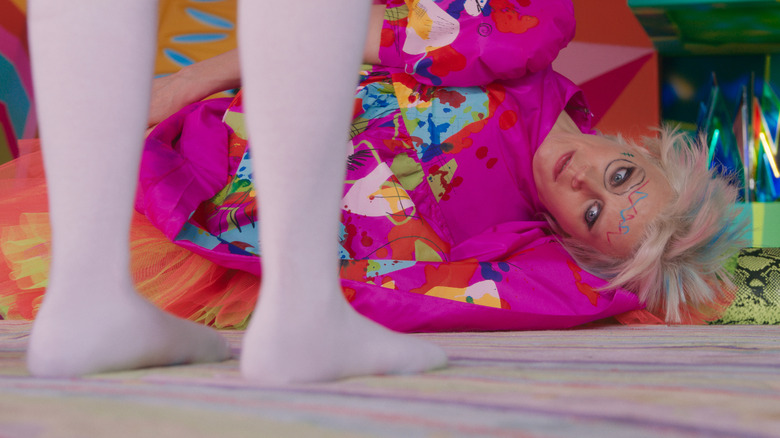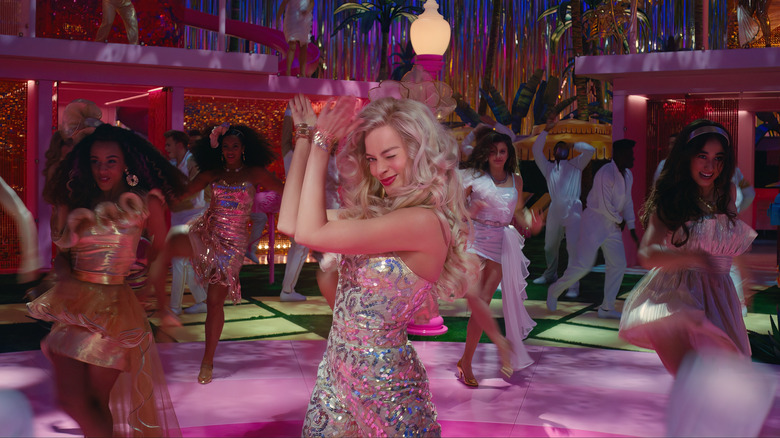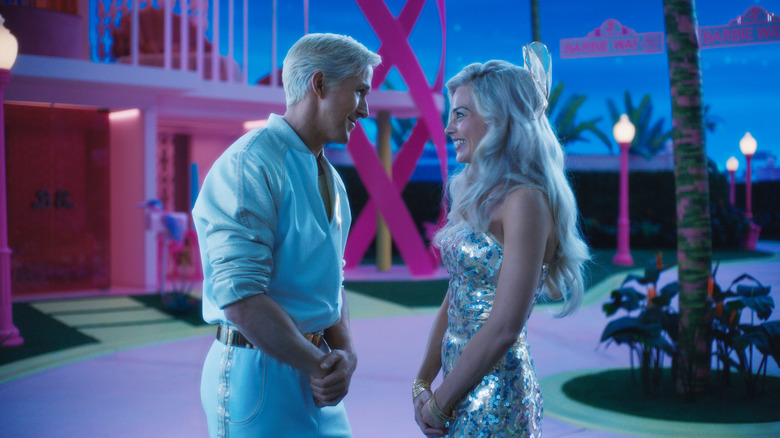Why Barbie Blew Everyone Away At The Box Office
In cinema's biggest weekend of the year, Greta Gerwig's pink-saturated comedy "Barbie" has been crowned queen and Hollywood's breakout hit of the summer. Between the slow recovery from the disruptive COVID-19 pandemic in the film industry and the most recent Hollywood labor union strikes, the state of the entertainment field and theatrical turnout have been grim. On top of all that, the tried and true money-making method of massive franchises and sequels galore hasn't been generating ticket sales like it used to — simply look to the disappointing numbers of movies like "Ant-Man and the Wasp: Quantumania," "Shazam: Fury Of The Gods," or "The Flash."
No one could have predicted just how significant of an impact "Barbie" would have on moviegoers and the industry as a whole. Initially, Warner Bros. estimated that the film, which had an estimated budget of $100 million, would earn $75 million during its opening weekend in the United States — an already impressive number in its own right. But this projection underestimated the sheer power of the brand and its influence. Ultimately, "Barbie" made box office history in its opening weekend, scoring a record-breaking $155 million. The film collected an additional $182 million at the international box office, contributing to a grand worldwide total of $337 million. How did "Barbie" pull it off? Keep reading to find out.
Breaking records left and right
With "Barbie" playing on more than 4,200 screens in North America alone, even if you weren't one of the many who turned out to theaters over the weekend to see it for yourself, it was impossible not to spot hoards of fans donning pink within the vicinity. The hype around the film is as real as it gets. Presales came out to a whopping $30 million — the largest in Warner Bros. history — while select theaters offered showings as early as Wednesday the 19th. After earning $22.3 million on Thursday — the highest preview ticket sales of the year, beating out "Guardians of the Galaxy Vol. 3" and its $17.5 million — "Barbie" continued to perform strongly without any signs of slowing down. Friday's sales added $48.2 million, marking "Barbie's" $70.5 million opening day as the biggest debut of the year, beating out "Spider-Man: Across the Spider-Verse," which scored $51.7 million.
Not only is "Barbie" the biggest debut of the year, but it's the biggest debut ever by a solo woman director. The previous record-holder, "Wonder Woman," directed by Patty Jenkins, earned a $103 million opening weekend in 2017. The film is also fairing well for stars Margot Robbie and Ryan Gosling, eclipsing their previous highest-grossing openings, "Suicide Squad" ($134 million) and "Blade Runner 2049" ($33 million), respectively. With all eyes on "Barbie," the film has impressed critics and audiences alike, with a shared score of 90% on Rotten Tomatoes at the time of this writing.
Genius marketing
Hats off to the "Barbie" marketing team for an infectious campaign that spread like wildfire in the weeks leading up to the film's release. Thanks to a massive social media presence, internet memes, major editorial write-ups, and eye-catching brand partnerships, interest in the film has gone beyond the obvious demographic of nostalgic women and girls. "Barbie" is on everyone's radar, whether they like it or not. It helps that Barbie is already a widely recognized brand, but in some ways, these preconceived notions can hinder the film's efforts to set itself apart from the toy's past. The real marketing success came from rewiring expectations. "People generally hear 'Barbie' and think, 'I know what that movie is going to be,' and then they hear that Greta Gerwig is writing and directing it, and they're like, 'Oh, well, maybe I don't," Margot Robbie told British Vogue in 2021.
The "Barbie" craze is something of a capitalistic monolith — a concept that the movie goes on to criticize in its cheeky, satirical style of comedy. Official partnerships have included NYX's Barbie makeup line, Ruggable's Barbie rugs, Burger King's questionable burger with pink sauce, Coldstone Creamery's cotton candy ice cream, and more. To keep up with the trend, other brands have hopped on the bandwagon to sell unofficial Barbie-inspired products, which explains why you've been seeing pink everywhere. It's unclear how much money has gone into "Barbie's" marketing, but boy, was it money well spent.
Barbie goes viral
It may seem like "Barbie" became a viral sensation overnight, but it's been a long, carefully crafted road for the internet's newest pseudo-influencer. Back in April, the release of the official "Barbie" movie trailer and promotional posters kicked off a trend of people posting customized "Barbie" posters featuring everyone from celebrities to animals to political figures. But this was only the beginning of the monsoon of memes and trends that would soon overtake the internet. Soon enough, people began screengrabbing stills from the trailer to curate their own memes. One of the more popular ones features a still of Ken leaning on Barbie's shoulder. Accompanying captions consist of making comparisons to real-life vulnerabilities or obsessions. "Barbie" memes have become so widespread that the absurdity of the film's rampant internet takeover became a meme within itself.
We can't talk about the "Barbie" social media presence without mentioning the "Barbenheimer" phenomenon. Opening on the same weekend, Christopher Nolan's epic biopic "Oppenheimer" has been lightheartedly pitted against its rival, "Barbie." The two films couldn't be more different from each other. One is a serious dramatization of the creation of the atomic bomb, while the other is a colorful feminist comedy about a child's plaything. Although the discourse online is presented as a competitive back-and-forth of who will come out on top, both films have benefited from the "rivalry."
The power of Barbenheimer
So just how much did "Barbenheimer" play into "Barbie's" box office success? Based on AMC Theaters' 40,000 double feature ticket sales, one can confidently say that the stars aligned for both films. Although "Oppenheimer" couldn't keep up with the numbers of "Barbie," the film similarly exceeded expectations and achieved $80.5 million domestically and another $93.7 million internationally. Together, they grossed more than $511 million worldwide. Now that's teamwork.
Audiences have made an event out of the opening weekend by hosting themed parties and dressing up for screenings. The cast and crew were in on it, too, buying tickets for each other's movies and posing for pictures. "It's all love — double up, double up twice," Greta Gerwig told The Hollywood Reporter. "I think you've got to see what the experience is, 'Barbie' then 'Oppenheimer,' 'Oppenheimer' then 'Barbie.' I think you've got to take all of the journeys." In addition to being financially successful, the cultural impact of both films has reignited the spirit of the moviegoing experience.
Dusting off your childhood dollhouse
Between all the tired reboots and adaptations, Hollywood has a long history of tapping into audiences' universal feelings of nostalgia. Although it can feel cheap and gimmicky at times, in the rare when instances it's utilized in an authentic and faithful way, it can result in a more satisfying and elevated movie experience. At first glance, a cynical person may write off Greta Gerwig's "Barbie" venture as the director selling out, but anyone who's seen the film understands the necessity of "Barbie's" thoughtfully self-aware fan service. Gerwig isn't just slapping the name of "Barbie" on her film and hoping it speaks for itself. Instead, she's integrated the doll's identity into the very fabric of the film's storytelling. "Barbie" acknowledges both the good and bad of the brand's past and isn't afraid to call itself out. It's in these moments that Barbie's original purpose of empowering young girls to dream big really shines through.
Audiences who grew up playing with Barbie or knew someone who did can feel good while revisiting a simpler time in their lives. The real world can be a dark place, and although we don't need the "Barbie" movie to remind us of this, it's worth acknowledging. The uncertainty of the future only makes these existential feelings even more uncomfortable, so cut Barbie and her viewers some slack next time you want to judge them for celebrating their inner child. "Barbie" knows how to have fun, and for many, this is their chance for some well-overdo escapism.
Made for everyone
The first-ever Barbie fashion doll hit the toy market more than 60 years ago. That's five generations of people who have grown up with Barbie. Since then, Barbie has evolved into more than just a toy. She's a cultural icon recognized all over the globe as a trendsetter, a symbol of empowerment, and a versatile hard worker. She exudes femininity but relates to a broader spectrum of people beyond young girls. Aware of Barbie's long history and prominent characteristics, Greta Gerwig set out to make a "Barbie" movie that anyone and everyone could enjoy.
With a PG-13 rating, the film manages to be both entertaining and accessible for all ages. "I've never thought of such a sharp delineation of like what's for kids and for adults. I just don't see it as church and state," Gerwig told the Associated Press in July 2023. "We all have some sense of childhood and sense of moving out of it, too, which I think is something that I probably will be forever interested in."
Gerwig's previous two films, "Lady Bird" and "Little Women," share similar themes with "Barbie," including self-discovery and the human condition — both universal experiences. For years, Barbie only represented the smallest margin of women — thin, white, and able-bodied. Mattel has slowly incorporated more representation, including different body sizes, ethnicities, and disabilities. But for some, Gerwig's "Barbie" feels like the first time they've seen themselves truly reflected in Barbie and her messaging.
Star power
Barbie has some big high heels to fill, but luckily, casting directors Lucy Bevan and Allison Jones understood the assignment. The ensemble cast full of Barbies and Kens makes for a believable alternate universe where everything is (or at least seems) absolutely perfect. "We needed actors who could get the fact that our Barbies only knew pleasant things," Jones told Vanity Fair. What we got was a refreshing mix of recognizable and up-and-coming faces, including "Insecure" creator and star Issa Rae as President Barbie, "Sex Education" lead Emma Mackey as Physicist Barbie, "Transparent" star Hari Nef as Doctor Barbie, "Saturday Night Live" alum Kate McKinnon as Weird Barbie, and many more.
As for Barbie herself, AKA Stereotypical Barbie, Margot Robbie, who produced the project under her company LuckyChap, became the obvious choice to represent the most identifiable version of the doll. "If [Mattel] hadn't made that change to have a multiplicity of Barbies, I don't think I would have wanted to attempt to make a Barbie film," Robbie revealed to Time.
It's easy to forget about the Kens, but with so many standout, comedic performances, it would be criminal not to give credit to the actors. The Kens come from all walks of life, including "Shang-Chi and the Legend of the Ten Rings" lead Simu Liu, "Sex Education" star Ncuti Gatwa, "Secret Invasion" villain Kingsley Ben-Adir, and of course, Michael Cera as the one and only Allan. Their leader, played by Ryan Gosling, delivers such a convincing performance that there had to be a word made up to describe it: Ken-ergy.
Satisfying Easter eggs
Part of the fun of "Barbie" is pointing out all the carefully placed Easter eggs throughout the film. With numerous variations of the doll and beloved animated films, there was plenty of existing material to pull from and incorporate into the "Barbie" movie. One of the many ways the film pokes fun at itself is its inclusion of discontinued dolls, including characters like Sugar Daddy Ken, Growing Up Skipper, Earring Magic Ken, Video Barbie, and Midge, Barbie's pregnant best friend. Barbie's pooping dog Tanner also makes an appearance. Dedicated fans will appreciate the recreation of the doll's notable outfits, including her original black-and-white striped one-piece suit in the opening scene.
Then there are the true-to-life details of Barbie's dreamhouse. A mix of 3D items and 2D decals, the life-size dreamhouse functions exactly like it would if a little girl were controlling it. Since there's no water or edible food in Barbieland, Barbie doesn't really understand the mechanics of eating or drinking. Beyond the dreamhouses, you'll find Midge and Skipper's treehouse modeled after the real-life toy. At the beach, there's pink sand only and an homage to the 2005 animated film "The Magic of Pegasus" carved into the rocks. But perhaps the most wholesome Easter egg in the film is the homage to Barbie's creator Ruth Handler (played by Rhea Perlman) and her daughter Barbara, who inspired the Barbie name.
A memorable soundtrack
Leading up to the film's release, the "Barbie" soundtrack became another surefire way to get audiences excited about the movie. With a roster full of A-list artists, there's a song for everyone. Dua Lipa's disco-pop anthem "Dance the Night" debuted first as the "Barbie" lead single — a tune all about dancing away any less-than-happy feelings. After that, the entire lineup was announced and slowly released over time. The album features a variety of artists with different sounds, creating a wide range for a movie that heavily utilizes its score and soundtrack.
While traveling to the real world, Tame Impala's funky, psychedelic track "Journey to the Real World" fittingly plays over the montage. During a comedic chase sequence, Charli XCX's upbeat electropop "Speed Drive" adds to the fast-paced excitement. Next thing you know, you're shedding a tear to Billie Eilish's ballad "What Was I Made For?" But you'll feel bad like a Barbie again once the credits roll and "Barbie World" by Ice Spice and Nicki Minaj plays, featuring sampling from Aqua's iconic song "Barbie Girl."
Gosling even makes an appearance on the album with his deeply personal and emotional song "I'm Just Ken." In his lyrics, Ken reflects on his life's purpose as Barbie's other half. "I'm just Ken. Where I see love, she sees a friend. What will it take for her to see the man behind the tan and fight for me?" It's played for laughs but adds just as much to the film as any other song featured on the soundtrack. It's unironically a bop.
Perfect timing
A film as campy, unserious, fun, original, and refreshing as "Barbie" couldn't have come at a more perfect time. The existence of "Barbie" in an industry of regurgitated reboots, sequels, and franchises feels like a breath of fresh air. Sure, the film is centered on a kid's toy backed by a company begging you to buy its products, but Greta Gerwig looked beyond that and created a story worth telling. Meanwhile, it wound up perfectly paired with a tonally opposite movie. Somehow, this became known as "Barbie" v. "Oppenheimer," the movie event of the summer, if not the year. It defied all odds in a year of back-to-back box office disappointments and made going to the theaters fun again in the accessible age of streaming. It's not as easy as it once was to convince the public to leave their houses and pay for a movie ticket, but "Barbie" captured everyone's attention in a way that hasn't been done in years.
For every Barbie girl who grew up playing with the doll, there's someone who holds negative feelings toward the film's unapologetic approach to feminity and the female experience. They'll take any chance they can get to discredit the film for its unserious, fun-loving approach or empowering messaging. Not everyone is going to love "Barbie," and that's okay. There have been years of discourse surrounding the doll and her mistakes, but her evolution is the kind of hero's journey everyone should give a chance.
